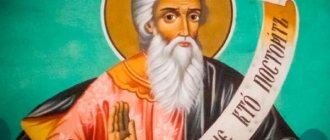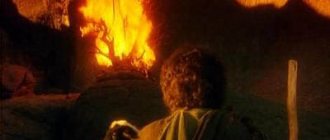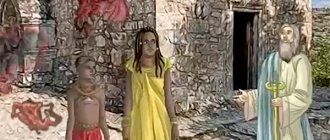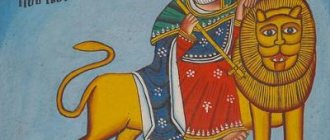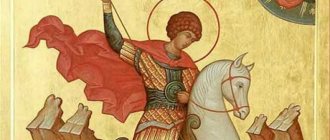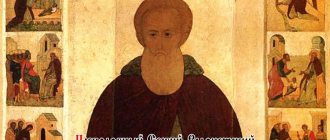Life of the Prophet Daniel
600 years before the birth of Christ, Jerusalem was conquered by the king of Babylon. At the entrance to the city, the temple, which was erected by Solomon, was destroyed, most of the people of Israel were taken captive. Among them were young men of noble families - Daniel, Azarius, Ananias and Misail. The king of Jerusalem ordered that the boys be raised among the nobility and taught Chaldean wisdom. Despite this, they tried to live simply and adhere to their faith. Daniel came from a royal family, the tribe of Judah. This moment largely determined the future of friends.
One of the first tests of faith was when the boys gave up meat and other foods. The king said to monitor the condition, and if it did not worsen, allow them to eat based on their own preferences.
For the first time, prophetic abilities appeared when Nebuchadnezzar had an unusual dream. Only the young man Daniel could interpret its meaning. Struck by his wisdom, the king made him chief of all the sages of Babylonia. The high position was preserved during the reign of subsequent kings.
During the reign of Darius, they wanted to give the seer a high rank, but due to intrigues at court, everyone learned about Daniel’s faith. By order of the king, he was thrown into a pit with lions, who did not touch him. The king saw this as a sign and released the saint. According to Daniel himself, he was protected by an Angel sent by God. After this, Darius ordered to believe in the almighty Jehovah. Throughout the reign, friends were revered.
The last days of the prophet's life are associated with the reign of Cyrus. According to some information, all the friends died themselves, never freed from captivity. According to other information, the saints were killed by the minions of the Persian king Cambyses.
"Cave action"
In the 16th–17th centuries, on the last Sunday before the Feast of the Nativity of Christ, in the Assumption Cathedral of the Moscow Kremlin, in Novgorod and other cities where there were cathedrals, a special church rite called “Cave Action” (a kind of liturgical drama with elements of theatrical performance) was performed. came to Rus' from Byzantium, but was not preserved in the Greek original, but remained in the book Great Consumer.
Large chandeliers in the temple were removed to make room for a round wooden stove. Three boys and two adults portrayed youths and Chaldeans (the so-called Semitic tribes that conquered Babylon from the Assyrians). Right during the service, the mummers of the Chaldeans took the bound youths out of the altar and interrogated them, after which they threw them into the oven - for refusing to fulfill the royal command to kneel before the idol. A forge with coals was placed under the stove, and at this time the youths sang a song praising the Lord. At the end of the singing, the sounds of thunder were heard and an angel sent by God descended from under the arches of the church. The Chaldeans fell on their faces, then took off their clothes and stood in silence with bowed heads while the youths and the angel walked around the oven three times.
True, this ritual was banned by Peter I. But we can still see its reconstruction today - the scene of the “Cave Action” in the Assumption Cathedral was included in Sergei Eisenstein’s film “Ivan the Terrible.”
“The pious youths in the cave” is a favorite subject of Christian iconography, known since the 7th century. He was especially loved in Rus'. According to some historians, the whole point is in the analogy drawn between the Babylonian captivity of the Jews and their oppression from King Nebuchadnezzar with the Tatar-Mongol conquest of Rus' and oppression from the Horde khans.
And the model for the Russian princes who found themselves in “Horde captivity” was the behavior of the prophet Daniel and the youths Ananias, Azariah and Misail in Babylonian captivity. After all, according to the Bible, their main principles were devotion to faith and... conscientious service to the “filthy king” as advisers; courage and... careful evasiveness, cunning, foresight. On the eve of his death, taking monastic vows, Prince Ivan Kalita even took the name of one of these youths - Anania.
“And Daniel became great before the people from that day onward.”
It is believed that Daniel lived to an old age (according to some sources, up to 100 years old) and was buried in the city of Susa in southern Iran. However, the 1st century Jewish writer Josephus reported that the body of the prophet lay in a tower at Ecbatana in Parthia next to the bodies of the kings. According to other versions, his tomb is located either in Kirkuk or in Samarkand - it is believed that the remains of the saint were brought there by Tamerlane - and nearby grows a 500-year-old pistachio tree, which was completely withered, but in the 2000s it suddenly sprouted green shoots.
Cave action. N. Roerich, 1905
But the Jewish tradition does not classify Daniel as a prophet, since he did not speak directly with God, but with “the angels of the Lord.”
But for Christians, Daniel is a prophet to whom Jesus Christ himself referred, and the song of thanksgiving of the youths (“Prayer of the Holy Three Youths”) has been part of Christian hymnography since the 4th–5th centuries.
In art
“The pious youths in the cave” is a favorite subject of Christian iconography, known since the 7th century. This motif was a frequent theme in fresco painting, see, for example, the painting of the Moscow Annunciation and Assumption Cathedrals, as well as icon painting. The white stone relief of the Assumption Cathedral in Vladimir is famous.
In the painting of the New Time
- Painting by J. Turner
- Painting by N. P. Lomtev, Tretyakov Gallery
- Painting by Simeon Solomon in the Pre-Raphaelitism style, 1863.
In literature
- “About King Nechadnezzar, about the golden body and about the three youths who were not burned in the cave” (1673-1674) - a comedy by Simeon of Polotsk, written for Tsar Alexei Mikhailovich and entirely dedicated to the story of the three youths;
- Shadrach in the furnace is a fantasy novel by Robert Silverberg.
In music
- The Burning Fiery Furnace - opera by Benjamin Britten
- The song Shadrach by the Beastie Boys, of the same name by Louis Prim
- The Fourth Man in the Fire song by Johnny Cash
- One of the cross-cutting themes of reggae music: the Viceroys song “Shadrach, Meshach and Abednigo”, the Twinkle Brothers song “Never Get Burn”, the Abyssinians song “Abendigo”, Bob Marley & the Wailers “Survival” and the Steel Pulse song “Blazing Fire” on the album "African Holocaust".
Biblical Text Analysis
The prayers of the youths with confession of the sins of the Jewish people and their song of thanks after the appearance of the angel (3, 24-90) appear only in the Septuagint; they are not in the original text of the Old Testament.
The complexity of the composition of this plot is evidenced by the fact that the Babylonian names given to the Jews originally belonged to local gods or residents, that is, there is a possibility that the theme with the unsuccessful burning of three characters in the fire was borrowed by Jewish mythology, like some others, from Babylonian , preserving the names of the original heroes, attached to Ananias, Mishael and Azariah with an explanation of the rite of renaming.
Folklorists note the similarity of the plot of the fiery furnace with the mythological plot of “fire hardening”, widespread among many peoples (the hardening of the baby Demophon by Demeter the maid in the hearth, one of the options for the hardening of Achilles by Thetis - in the fire, the furnace of Baba Yaga, which allows Ivanushka and others not to die, but to gain strength to crush the old woman, etc.). Researchers suggest that the root of these motives is the ancient (unsurvived) rite of initiation by fire - a test, hardening, which endows a teenager with the qualities of a man.
Changing the name of the youths
Theological interpretation
Consideration of the history of the three youths is already found among early Christian theologians. So Cyprian of Carthage (first half of the 3rd century), in his essay on martyrdom, sets the youths as an example, believing that they “despite their youth and cramped position in captivity, by the power of faith they defeated the king in his very kingdom... They believed that they could avoid death according to your faith..."
John Chrysostom in his essay “The Tale of the Three Youths and the Furnace of Babylon” emphasizes that the youths, going into the furnace, did not tempt God, hoping for an inevitable deliverance, but as proof that they do not serve God for pay, but sincerely confess the truth. The saint also notes that Daniel’s absence from the oven was a special providence of God:
Basil the Great, in his Homily on the Holy Spirit, in the chapter on the contemporary state of the church, gives credit to the Babylonian youths for the fact that they, being alone among the Gentiles, did not talk about their small numbers, but “even in the midst of the flames they sang songs to God, not talking about the multitude of those who reject the truth, but being content with each other when there were three of them.”
Gregory the Theologian cites the youths as an example of the proper state of priests: “Boldly coming under the yoke of the Priesthood, rightly do your ways and rightly edit the word of truth, with fear and trembling, thereby working out your salvation. For our God is a consuming Fire, and if you touch Him like gold or silver, then do not be afraid of being burned, like the Babylonian youths in the furnace. If you are made of grass and reeds - from a flammable substance, like one who philosophizes about earthly things, then be afraid lest the Heavenly Fire burn you."
Daniel, Hananiah, Mishael and Azariah
In the book of the prophet Daniel, the theme of the faithful remnant is discerned, which does not participate in the abominations of the earth. Daniel, Hananiah, Mishael, and Azariah follow the surest prophetic word. The Gentiles and King Nebuchadnezzar Testify How Daniel and His Friends Differ from Other Jews
Dear friends, thank the Lord for this wonderful opportunity at the beginning of the Sabbath rest to meet and glorify the Lord in prayer, in thanksgiving and turn to the most faithful prophetic word! We spoke to you last time about the abomination of desolation, which leads to devastating wickedness. Of course, this biblical question requires serious study. But by examining the Holy Scriptures, we find that we do not need to build some incomprehensible illusions in our minds and draw an abstraction about the abomination of desolation and observe what is happening in the world, where this abomination of desolation will manifest itself. We have discovered that the abomination that makes desolate is an invention of Satan. Better to say, idolatry, which leads to devastating wickedness. Therefore, praise the Lord for the real truth, which makes us free from human ideas!
And to put an end to this issue, let's look at how this is expressed in the psalm. “Daughter of Babylon, desolator! blessed is he who repays you for what you have done to us! Blessed is he who takes and dashes your babies against a stone! (Psalm 136:8,9).” I would like to draw your attention. For biblical thinking, Babylon is a desolation, a desolator. The daughter of Babylon is a devastator. Therefore, Babylon itself is an abomination in the eyes of heaven. But it is this Babylon that leads to devastation. The psalmist says: Blessed is he who dashes your children against a stone. Remember, in chapter two we are presented with an image. This is Babylon. And how does he end his procession? A stone is torn from a mountain without the assistance of hands. Let's take another chapter of the seventeenth book of Revelation. Before we read how this prophecy is fulfilled upon the desolating wickedness, how God will bring judgment upon the desolating wickedness.
“And the woman was arrayed in purple and scarlet, adorned with gold and precious stones and pearls, and had a golden cup in her hand, filled with abominations and the filthiness of her fornication; and on her forehead was written a name, a mystery: Babylon the great, mother of harlots and abominations of the earth. I saw that the woman was drunk with the blood of the saints and the blood of the witnesses of Jesus, and, seeing her, I marveled with great surprise. (Revelation 17:4-6)." Is Babylon connected with abomination or not? And she is being judged. This is already discussed below. “And one strong angel took a stone like a great millstone and threw it into the sea, saying: With such a desire will Babylon, the great city, be overthrown, and it will be no more. (Revelation 18:21)." We took a quick look and saw how the prophecy of Psalm 137 is described in the book of Revelation. “The daughter of Babylon is a desolator. Blessed is he who takes your children and dashes them against a stone.”
Do you notice or not? Therefore, all those who are involved in this unholy alliance, they will be stopped by a stone without the help of hands. The stone, like a great millstone, is torn from the mountain without the aid of hands, destroying Babylon, an abomination that leads to devastating wickedness and becomes a great mountain. Therefore, I don’t think it’s wise to draw some kind of abstraction for yourself. The Bible clearly tells us what the essence of this expression is. In the beginning is the abomination of desolation, this is artificial religion in any of its manifestations. It doesn't matter whether it's idolatry or an artificial vaalinized religion. That is, what is a Vaalinized religion? This is syncretism, unification. Christianity takes pagan customs and adapts them into its practical Christian daily life. Therefore, all these abominations lead the people to devastation.
Therefore, in the book of the prophet Daniel the theme of a faithful remnant is seen, which does not participate in the abominations of the earth. They follow the surest prophetic word and are presented to us as a faithful remnant. Before talking about this remnant, it should be said that today in Christianity, which claims to be a faithful remnant, a demonic doctrine has been invented, a remnant within a remnant. I'll tell you what this means, or better yet, what it was done for. This is done to justify their wickedness. After all, it is convenient to sit on the bench of Babylon and say: yes, if everyone has retreated, but here there are still seven thousand human names, that is, as if there were a remnant within a remnant. But this topic only at first glance seems biblical, but it is an anti-biblical topic. But imagine the picture. Israel is located in Egypt. Leaves Egypt. Was he called a remnant?
Has Israel, the whole Israel, ever been called a remnant in the pages of Scripture or not? It was never called a remnant. Friends, if we are a remnant, can we sit on benches represented by those people who officially shake hands on behalf of the worldwide Seventh-day Adventist corporation with the man of sin, the son of perdition? Can these people, who sit silently on benches, be called a remnant of a remnant? Therefore, see how they artificially invent doctrines to justify their wickedness. But at the same time, the people are heading towards devastating wickedness. Because the leaders have invented an artificial religion, which is an abomination to God in the eyes of heaven. Satan destroyed the Temple of Jerusalem, and he does not rest on this. He now needs to desecrate the temple of the Holy Spirit. Therefore, to everyone whom he brought out of Jerusalem, he assigns food from the royal table and wine, which he himself drinks.
Daniel, Hananiah, Mishael and Azariah appear. For the benefit of the matter, let's read the testimony. “And the chief of the eunuchs renamed them Daniel Belteshazzar, Hananiah Shadrach, Mishael Meshach, and Azariah Abednego. Daniel decided in his heart not to be defiled by the food from the king's table and the wine that the king drinks, and therefore asked the chief of the eunuchs not to be defiled by him. God granted Daniel favor and favor as the chief of the eunuchs (Daniel 1:7-9).” Obviously, we are talking about four friends who, unlike other Jews, were taken out of Jerusalem. Only four people are brought to our attention. Supposing that those Jews whom Nebuchadnezzar brought out were a remnant as a whole, how can this remnant call itself a remnant if they were brought to Babylon by reason of a general apostasy?
And in this remnant there appears another remnant, numbering four people, whom Daniel, Hananiah, Mishael and Azariah represent to us. Isn’t this too complicated, dear friends, what do you think? They were taken out. They didn't come out on their own. They were taken out by force. If we imagine them as a remnant, then why did God forcibly resettle His remnant to Babylon? This is the same problem. Isaiah says: If Israel were to be eaten as the sand of the sea, only a remnant would be saved. Israel never as a whole represented the remnant. He represented Israel. There were twelve tribes in it, and God does not speak about all the people, but only about the remnant. He speaks of Israel as Israel, and speaks of the remnant as the remnant. In general, the Bible nowhere teaches us such a doctrine, dear friends. We need to note this to ourselves. The remnant is a doctrine invented largely not by theologians, but by Christian psychologists, to justify the apostasy of one or another religious organization.
Or they give the parable of the wheat and the tares. This is the only parable that is currently being commented on. They say: you see, in the church until the second coming there will be both wheat and tares. But Jesus says: the field is the world. This parable is not talking about the church. This parable speaks generally about peace. There is both wheat and tares in this world. And this will happen until the second coming of Jesus Christ. Therefore, if you carefully read the Holy Scriptures, the remnant is not a remnant within a remnant. The remnant is among general Christianity and not in any particular denomination. They themselves, this denomination called themselves a remnant. But if they are a remnant, then we must know by their fruits whether they are a remnant. If we find anti-Biblical teaching, what remnant could it be? Therefore, I specifically tried to explain from different angles that this doctrine was invented on purpose. It is not a biblical doctrine.
We find that in the book of the prophet Daniel the remnant is, as it were, a counterattack against Satan, which is leading apostate Protestantism, which is engaged in the abominations of Babylon, it is leading them to devastation. But there is a faithful remnant. The faithful remnant are not under the influence of an artificial religion that men have created, but so says the Scripture, so says the Lord. This is what makes a faithful remnant different. He does not call himself the faithful remnant. In the second chapter we see the manifestation of the faithful remnant who, unlike the Babylonians who were in confusion after King Nebuchadnezzar issued a decree to kill all the wise men of Babylon, Daniel, Hananiah, Mishael and Azariah, let's see their actions. What are they doing in these troubled times? “Daniel came to his house and told the matter to Hananiah, Mishael and Azariah, his companions, so that they would ask mercy from the God of heaven about this secret, so that Daniel and his companions would not perish with the other wise men of Babylon. (Daniel 2:17,18)."
This means that to pray at home, glorify God, study His holy word, I don’t find in the Bible that the Bible says that somewhere in a certain place you need to gather and ask for mercy from God. Where there are two and three there is Jesus. That is, the Babylonians are in fear. Everyone is worried about how things will end. But the remnant, unlike them, come to the house and ask their God. In the third chapter we see the vile worship of the golden image. How does the faithful remnant manifest itself on the field of Deir? “From now on, if you are ready, as soon as you hear the sound of the trumpet, the flute, the zither, the harp, the harp, the symphony, and all kinds of musical instruments, fall down and worship the image that I have made; If you do not worship, then at that very hour you will be thrown into a fiery furnace, and then what God will deliver you from my hand? And Shadrach, Meshach, and Abednego answered and said to King Nebuchadnezzar, There is no need for us to answer you to this. Our God, whom we serve, is able to save us from the fiery furnace, and will deliver us from your hand, O king. (Daniel 3:15-17)."
Is this a remnant or not? I would like to remind dear friends that in the book of Daniel, neither Daniel, nor Hananiah, nor Mishael, nor Azariah ever proved to anyone that they were a faithful remnant. This has never happened before. But it should be noted that all the heathen kings testify to the faithful remnant. In chapter four, King Nebuchadnezzar testifies about Daniel, how Daniel and his friends are different from the other Jews. “At last Daniel came in unto me, whose name was Belshazzar, after the name of my god, and in whom was the spirit of the holy God; I told him the dream. Belshazzar, chief of the sages! I know that the spirit of the holy God is in you and no mystery troubles you; Explain to me the vision of my dream that I saw and its meaning. (Daniel 4:5,6)." Did Daniel convince Nebuchadnezzar that the spirit of the holy God was in him, or was Nebuchadnezzar himself testifying to the remnant? Look how he continues this thought.
“I saw such a dream, King Nebuchadnezzar; and you, Belshazzar, tell me its meaning, since none of the wise men in my kingdom could explain its meaning, but you can, because the spirit of the holy God is in you. (Daniel 4:15).” That is, Nebuchadnezzar himself testifies to Daniel as a remnant. No one, he says, can, but you can, and explains the reason. Why? Because you have the spirit of a holy God. It is Daniel, Hananiah, Mishael and Azariah who become the temple of the Holy Spirit, and the spirit of the holy God abides in them. Today, what is the question regarding the remainder? In religious organizations, the gift of the Holy Spirit is attributed to only one person, as a prophet. There is some special person and the spirit of the holy God is in him. He interprets dreams for them. Gives evidence. Is this the way the question is addressed in the Bible? What about Joel’s prophecy: “And it shall come to pass after this that I will pour out My Spirit on all flesh, and your sons and your daughters shall prophesy; Your old men will dream dreams, and your young men will see visions. (Joel 2:28)."
How can this gift be attributed to any one person? Remember in the book of Numbers, the Holy Spirit was poured out on two young men. Joshua came to Moses and said: you know, there are two people prophesying, we must forbid them. Moses says: why are you so jealous for me? If the Holy Spirit were poured out on all the people and everyone began to prophesy, how good it would be. Remember moments like this, friends? Therefore, see how in the fifth chapter the pagan kings and queens testify to the faithful remnant. When God wrote the sentence “MENE, MENE, TEKEL, UPHARSIN” to Belshazzar, no one can understand what God wrote on the wall. What does the queen say?
“There is in your kingdom a man in whom is the spirit of the holy God; In the days of your father, light, reason and wisdom were found in him, similar to the wisdom of the gods, and King Nebuchadnezzar, your father, made him the head of the mystic scholars, charmers, Chaldeans and fortune-tellers - your father himself, the king, because in him, in Daniel , whom the king renamed Belshazzar, turned out to have a high spirit, knowledge and intelligence, capable of explaining dreams, interpreting the mysterious and resolving knots. So let Daniel be called and he will explain the meaning. (Daniel 5:11,12)." Did Daniel prove that he had the holy spirit or not? And how does the blasphemous king Belshazzar perceive the testimony of the pagan queen? “I have heard about you that the spirit of God is in you, and light, and intelligence, and high wisdom is found in you. (Daniel 5:14).” That is, if we carefully read the book of the prophet Daniel, we find that Daniel, Ananias, Misail and Azariah, being on the territory of the ungodly Babylon, wished to keep their bodies undefiled from the dishes of Babylon in order to be the temple of the Holy Spirit.
And God worked in these people. The lesson is very simple. Daniel, Hananiah, Mishael and Azariah do not prove to anyone that they are a faithful remnant, and they do not prove to anyone that the Holy Spirit is in them. The pagans testify that the Holy Spirit is in Daniel, Hananiah, Mishael, and Azariah. Now let's see what it looks like in chapter six. All kings bear witness to the remnant. “Daniel was superior to other princes and satraps, because he had a high spirit, and the king was already thinking of placing him over the entire kingdom. (Daniel 6:3).” That is, historical chapters from chapters 1 to 6 present us with an illustration, showing what the remnant should be like that will meet Jesus in the territory of spiritual ungodly Babylon. We, like Daniel, Hananiah, Mishael and Azariah, live in the territory of spiritual, ungodly Babylon. They lived in literal Babylon, and we live in the territory of spiritual Babylon.
That Babylon was condemned, and spiritual Babylon was condemned. A stone like a large millstone. Therefore, coming up with some ideas to justify your importance in this world by calling yourself a remnant is a serious problem. God must name His remnant. The remnant must be like the heroes of the faith of past centuries, who are left to us as images. And the prophecy represents the faithful remnant. “And he will speak words against the Most High and oppress the saints of the Most High; He will even dream of abolishing their holidays and the law, and they will be delivered into his hand until a time and times and half a time. (Daniel 7:25).” The remnant was delivered into the hands of the little horn. After all, this is an illustration. For the benefit of the matter, let us open the first chapter again. We need to understand that the stories of Daniel, Hananiah, Mishael, and Azariah formed the basis for the prophecies of the end-time people.
“In the third year of the reign of Jehoiakim, king of Judah, Nebuchadnezzar, king of Babylon, came to Jerusalem and besieged it. And the Lord gave into his hand Jehoiakim, king of Judah, and part of the vessels of the house of God, and he sent them to the land of Shinar, to the house of his god, and brought these vessels into the treasury of his god. (Daniel 1:1,2)." Because of their wickedness, God delivered Israel into the hands of King Nebuchadnezzar. Could a good and loving God deliver His remnant into the hands of the wicked king of Babylon or not? But we see that God betrayed us for wickedness and there is a remnant there. Just like during the time of the prophet Elijah. He thought he was the only one left, but God says no. Today Adventists say we are a remnant. But God says, no, I still have people you don’t know about. In the first chapter, God delivers all of Israel into the hands of King Nebuchadnezzar, and here is the little horn. It is not God who delivers them into the hand of the little horn. They will be faithful in his hand until a time of times and half a time.
It is not God who betrays them. They will be betrayed. Because Satan claims. Well, to make it clear. Here are illustrations from the book of Job. Job also represents the faithful remnant who pray to God, who are afraid of sinning against God. And Satan says: Is Job fearing God for nothing? It was not God who delivered him into the hands of Satan. God allowed it. He says: here he is in your hand. Notice the key phrase? Just save his soul. God did not betray him. God allowed it. These are completely different things when God delivers into the hand of King Nebuchadnezzar and when the faithful remnant is delivered into the hands of the little horn. This is a completely different teaching. Therefore, when we work with the text of the Bible, we must strive to take out from the Bible only what God, and not man, put into the Holy Scriptures. Therefore we see that the actions of the faithful remnant are described in the language of the past. So it was with Daniel, Hananiah, Mishael and Azariah. Only there is a difference.
God delivered all of Israel into the hands of King Nebuchadnezzar, and there God appeared in the person of the faithful remnant. So let's look further in regards to the correct remainder. “And his strength will be strengthened (that is, a small family that will receive a mortal wound, but this mortal wound must be resurrected according to the prophecy of the 13th chapter of the book of Revelation), although not by his strength, and he will produce amazing devastation and manage to act and destroy the strong and a people of saints (Daniel 8:24).” He will destroy the people of the saints. Note that this has always been the case. Satan desires to destroy the faithful remnant for whom God ministers in the heavenly sanctuary through the heavenly high priest Jesus Christ, who desires to justify His people. Satan wants to destroy the nation of saints.
We must understand from the book of the prophet Daniel that if we, like the prophet Daniel, Hananiah, Mishael and Azariah, decide in our hearts to defend the real truth, then even if something happens to us in this world, this does not mean that Satan has made progress. God says: not even a hair of your head will fall without the knowledge of the heavenly Father. We must always remember this. The doctrine of the faithful remnant was left to us from the pages of Holy Scripture, so that we may maintain hope through the consolation of Holy Scripture. In chapter 9, Daniel prays for Israel. He does not say that anyone has sinned or that someone has not sinned. He does not say to the Lord, behold, they have sinned, but I, Hananiah, Mishael and Azariah, we are the faithful remnant. He says all Israel has sinned. All Israel sinned. Therefore, Gabriel further sets forth a Divine ultimatum or condition so that the people stop sinning, committing lawlessness and committing wickedness.
We will study this in detail. And what happened to Israel according to Daniel's prophecy? “And at the end of sixty-two weeks Christ will be put to death, and will not be; and the city and the sanctuary will be destroyed by the people of the leader who comes, and its end will be like a flood, and there will be devastation until the end of the war. (Daniel 9:26).” What will happen to the Jerusalem that Daniel prays for? It will be destroyed by the leader's people. That is, Israel, Jerusalem will be destroyed. “And the covenant shall be established for many for one week, and in the half of the week sacrifice and offering shall cease, and the abomination that makes desolate shall be upon the pinnacle of the sanctuary, and the final predetermined destruction shall come upon the desolator.” (Daniel 9:27).” Daniel says that the first covenant that God made with Israel will come to its logical end.
Christ will be put to death and will not be, but the city and the sanctuary come to their logical end, and a new covenant is concluded on new terms. Where do we find the doctrine of the remnant in the remnant? Is there a remnant doctrine here or not? That is, we, as the people of the new covenant, must be attentive to the action of God, who has always preserved a faithful remnant for Himself. Not the remainder in the remainder. It can not be. Well, here's the rest of the rest of how this harmful idea can influence people. We have a bag of potatoes. We understand that in this bag of potatoes, one third are bad potatoes. Despite this, we store these potatoes in one bag. Do you think that what was good, if you leave these potatoes with bad potatoes, will they disappear in the end or not? Well, how can there be a remainder in the remainder? After all, sin is like a cancerous tumor. God always sets aside a remnant for Himself. Be holy.
It cannot be what the corporation is teaching today, deceiving the people, the remainder in the remainder. Sin cannot be among the remnant. The remnant always openly confesses sin. If we confess our sins, then He, being faithful and righteous, will forgive us our sins and cleanse us from all unrighteousness. But we confess sins not in order to commit them again, but in order not to do it again. Because Jesus says: go and sin no more. Am I speaking clearly, friends? Chapter ten describes the vision of the great high priest. “And only I, Daniel, saw this vision, and the people who were with me did not see this vision; but great fear fell upon them, and they ran away to hide. And I was left alone and looked at this great vision, but there was no strength left in me, and the appearance of my face changed enormously, there was no vigor in me. (Daniel 10:7,8)." Look at the picture. Daniel sees a vision.
The rest are in great fear and only Daniel remains. Isn't this the doctrine of the remnant? Daniel is with the people. He sees a vision. They don't see. But at the same time they are attacked by great fear, and the prophet becomes as if dead. But the celestial dweller lays his hand on him and says: do not be afraid, for you are a man of desires. Doesn't this describe the story of the faithful remnant? In the eleventh chapter, what is said about the faithful remnant? We speak briefly to make it clear. “Those who act wickedly against the covenant he will attract to himself with flattery; but the people who honor their God will be strengthened and act. And the wise among the people will admonish many, although they will suffer for some time from sword and fire, from captivity and robbery. (Daniel 11:32,33).” We are presented with two groups of people. Some act wickedly against the Covenant. These are not atheists. What are they doing? They act wickedly against the Covenant. This means that they are in the covenant, but they are wicked people.
They are being dishonest. Wicked people. And others defend the real truth and at the same time suffer for some time from captivity, fire and robbery. This reminds us of the first chapter. Daniel, Hananiah, Mishael, and Azariah were in captivity. Nebuchadnezzar cut down all Israel with the sword. Even in the second chapter he scared: if you don’t tell me your dream, you will be chopped into pieces. And he burned Jerusalem with fire. But at the same time, despite these atrocities of King Nebuchadnezzar, Daniel, Ananias, Misail and Azariah defend the truth in the territory of the ungodly Babylon and admonish many. Here is the scenario for the New Testament people. Let's see how the book of the prophet Daniel ends. “Many will be purified, made white, and refined through temptation; But the wicked will do wickedly, and none of the wicked will understand, but the wise will understand. (Daniel 12:10).” Is the remainder described here?
Therefore, the theme of the faithful remnant is, as it were, opposed to the abomination of desolation, which leads apostate Protestantism to devastating wickedness. Don't you see this emptiness when you communicate with these people? Sometimes there’s even nothing to talk about. It seems that we all believe in one God. We're talking about the Bible. They look at us as if they don’t understand what we are talking about. They start telling us something that is not biblical. We also don’t understand what they want to tell us. We seem to be people who speak the same language, but we don’t understand each other. And the people of the Bible always understand each other. And the Babylonians, as in the 11th chapter of the book of Genesis, seem to be building one tower, but do not understand each other. And to those who base their faith on the cornerstone, Jesus gives understanding of one another. In the second chapter of the book of Acts, remember, God gave different languages. They understood everything they said. Therefore, glory to our Lord!
Today we briefly looked at the main topic. But that's not the main topic. The main theme is the revelation of Jesus Christ. The faithful remnant are those who preach the truth about Jesus Christ and it is set up as an outline argument against the abomination of desolation, which leads apostate Protestantism to devastating wickedness. The faithful remnant does not promote itself. Does not prove that they are a faithful remnant. They do not say that they have the spirit of a holy God. They never participated in syncretism on the field of Deir, adapting their religion to the worship of the golden image. What were the Jews doing there anyway? I don’t understand how a believer can be silent on the field of Deir? And now, instead of the idol, there is peace and security. Today they have the Pope instead of Nebuchadnezzar. He announces a meeting and everyone, without exception, comes to these councils and justifies themselves by deceiving their audience by saying that they are there as observers.
You understand, these are observers, they are there. But how can I understand this, I am an observer? But if you observe that they are changing the biblical statutes, then you, as an observer, must specifically say: what are you doing? The Bible says so. Why are they silently watching? And those sitting on the benches are very happy, saying: how our representation from the church is there, and there, and there. No need to be confused. Daniel, Hananiah, Mishael and Azariah did not serve voluntarily in the royal palaces. They were brought there by force as prisoners. And today, look, Christians who call themselves the faithful remnant are in the royal palaces. Were they forcibly taken there? Did you force labor? And the audience admires: thank God, our representative under the President of Russia! I'm not saying this is good or bad. Yes, be you anywhere, even the president himself. But what does the church and the president’s job have to do with it? These are completely different things.
Therefore, the biblically faithful remnant has nothing in common with the remnant that the religious organization represents to us today. Therefore, all these topics should form the basis for the study of individual prophecies. Because today, how are prophecies studied? They took a prophecy from the book of the prophet Daniel and began to interpret it. And we must look at what topic this or that prophecy is tied to. If we are talking about the remnant, then we must see the overall picture in the book of the prophet Daniel about the remnant and then we can understand this prophecy, what the prophet Daniel is talking about. When we study the prophecy of the abomination that causes desolation, we look at the prophecy throughout the book, not at random. Daniel, Hananiah, Mishael and Azariah are no different from us. Check out their first step. They desired in their hearts and did according to the word of God, and only then did God grant mercy to these four youths.
Daniel, Hananiah, Mishael, and Azariah trusted the word of God and God saw fit to bless His remnant. Although those Jews who defiled themselves with dishes from the king's table, I do not think that they considered themselves apostates. Therefore, praise the Lord for all these simple lessons that help the common man, living in the territory of the ungodly Babylon, to defend the real truth, like Daniel, Hananiah, Mishael and Azariah. Now let's see the conclusion. “The church chosen like you in Babylon and Mark my son greet you. Greet each other with the kiss of love. Peace to you all in Christ Jesus. Amen. (1 Peter 5:13,14)." Greetings to the chosen church like you, which is in Babylon. At the time of the apostles, Babylon no longer existed. It was destroyed and all Christians firmly believe that Peter writes this letter from Rome. That is, they considered Rome Babylon.
And today we live in a world that is also spiritual Babylon. Therefore, we are called, like Daniel, Hananiah, Mishael, and Azariah, to stand for the present truth. This is how the faithful remnant will be different. If we don’t promote ourselves, but if we live according to the word of God. We do not adjust the word of God to fit our faith, but believe in the word of God. Therefore, glory to our Lord!
